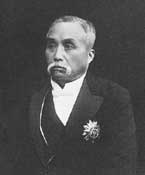Xu Shichang
From Kaiserreich

|
Xu Shichang (Chinese: 徐世昌, born on October, 20 1855 in Tianjin, China) is a Chinese politician. President of the Republic of China from 1918 to 1922, he became Premier of the Kuomintang following Sun Yat-Sen's death on March, 12 1925 and is the Prime Minister of the Chinese Imperial Council since the restoration of the Chinese Empire in which he was instrumental, on February, 2 1927.
Contents |
Biography
Early life
Xu's ancestral hometown was Yinxian County, Ningbo and Zhejiang Province. Born in Tianjin, he was Yuan Shikai's closest friend. He was at one time Viceroy of Manchuria and at the end of the early Qing dynasty he was made Chief of the General Staff, despite being a civilian. Serving as the Secretary of State, so as Premier, to his friend Yuan, Xu resigned in late 1915 in protest to his imperial ambition: he resumed his post after Yuan abandoned monarchism. His election as president on October, 10 1918 was largely engineered by Duan Qirui and his Anhui clique. He was chosen because he was a civilian yet had close ties to the Beiyang Army and was neutral to both its Zhili and Anhui cliques. Lacking any military power of his own, he had to play Duan, Zhili leader Cao Kun, and Fengtien leader Zhang Zuolin against each other to stay in power.
Presidency
After reaffirming Chinese neutrality in the Weltkrieg, a ceasefire with Sun Yat-Sen's rival Constitutional Protection government was declared in Shanghai and intellectuals were given greater freedom. This lasted until news from Europe showed how Duan Qirui promised German holdings in Shandong to Japan, which had been unveiled by the Germans as the war was going better for them. Large student protests, known as the May Fourth Movement, led to Xu cracking down with mass arrests. Consequently, the shaky alliance between the Zhili and Anhui cliques collapsed with Duan decisively defeated. This led to the era of high warlordism. Conflict with the south flared again in 1920 and he also failed to retake Mongolia. Cao Kun, who never liked Xu, pressured him out of office on June, 2 1922. and restored Li Yuanhong. His presidency was the longest during the warlord era.
Kuomintang and Restoration
Having already established contact with German advisers to the Kuomintang, Xu was convinced by them to join his former enemy Sun Yat-Sen, who reluctantly agreed to let enter in the Nationalist Party a former dignatary of the Qing Empire. Xu then joined the German-sponsored monarchist wing led by Kang Youwei, the mastermind behind Pu Yi's twelve-days-long restoration in 1917. Due to his former tenure as President, his own political experience and the help of Germans, Xu quickly rose to prominence within the Kuomintang, countering the rise of the young general Chiang Kai-Shek. On March, 12 1925, following Sun's unexpected death, Xu managed to be elected Premier of the Kuomintang, to almost everyone' surprise due to his position of leader of a monarchist wing within a republican party.
Xu Shichang issued in the end of the year, after having purged the Kuomintang, a Call to the Mighty German Empire, where he described the situation of complete anarchy of China and praised the Kaiser Wilhelm II for its achievements; a delegation was also sent to Pu Yi's retreat in Tientsin. The rival Guominjun in the North declared that the Kuomintang had betrayed the Republican cause and Feng Yuxiang invaded the Kuomintang-controlled zone, after securing alliance with the other northern warlords. The war was won thanks to German help, and Xu could officially restore the Qing Empire, being of course named as the Prime Minister. With German help, Xu expected to make great reforms in order to reinforce the country on an European model, but the political difficulties and the subsequent revolts proved the failure of his own project. As Xu is getting old and is reported to have violent conflicts with the Emperor, many expect him to quickly dismiss as soon as the Emperor will personally take control of the situation...
Xu Shichang's Imperial Council, 1927-...
- Prime Minister - Xu Shichang
- Minister of Foreign Affairs - Wang Zuanxu
- Minister of War and Commander-in-Chief of the Imperial Chinese Air Service - Fu Zuoyi
- Minister of Economy - K'ung Hsiang-hsi
- Minister of Interior - Qu Yangke
- Minister of Special Intelligence - Shang Zhen
- Commander-in-Chief of the Imperial Chinese Army - Wu Peifu
- Commander-in-Chief of the Imperial Chinese Navy (special advisor) - Otto Ciliax
- Chief of the Imperial Guard (special advisor) - Walther Stennes
